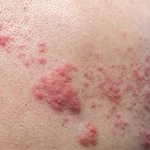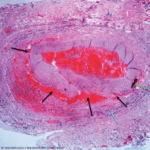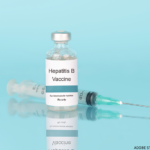(Reuters Health)—The live herpes zoster vaccine does not provide reliable long-term protection in rheumatoid arthritis (RA) patients taking tofacitinib, a recent study suggests. Current ACR guidelines conditionally recommend that patients with RA who are 50 years and older be vaccinated against herpes zoster prior to starting therapy with the Janus kinase (JAK) inhibitor tofacitinib or…
Search results for: herpes zoster
Herpes Zoster & Tofacitinib
Shingles, also known as herpes zoster (HZ), is a common and sometimes debilitating disease that disproportionately affects elderly individuals and those who are immunocompromised. Patients with rheumatoid arthritis (RA) have a 1.5–2-fold higher risk of developing HZ compared with healthy adults. Treatment with some disease-modifying anti-rheumatic drugs (DMARDs) has been shown to increase this risk….
Herpes Zoster & the Risk of Stroke in Patients with Autoimmune Diseases
Herpes zoster (HZ) infection, also known as shingles, is caused by reactivation of latent varicella-zoster virus infection generally acquired decades earlier. This study was designed to test the hypothesis that the incidence of stroke immediately following HZ infection is increased in patients with autoimmune diseases compared with the incidence of stroke at later time points. Results: In patients with autoimmune diseases, incident HZ was associated with as much as a twofold increased risk of stroke. Prompt antiviral therapy was associated with lower incidence of subsequent stroke…

2015 ACR/ARHP Annual Meeting: Stroke Risk Elevated after Herpes Zoster Infection Among Patients with Autoimmune Disease
SAN FRANCISCO—The risk of stroke after herpes zoster (HZ) infection is elevated in the period immediately after infection in patients with autoimmune diseases, according to a study presented at the 2015 ACR/ARHP Annual Meeting.1 The findings were presented in a scientific session, called Discover 2015, that highlighted new research. In another study from the session,…

Zoster Reactivation Risk in Patients Treated with Cyclophosphamide
Varicella-zoster-virus (VZV) reactivation, which can cause patients to develop herpes zoster (i.e., shingles), occurs more frequently in patients with systemic vasculitis and systemic lupus erythematosus (SLE) who have received intravenous cyclophosphamide than in otherwise healthy adults, according to a retrospective study published in The Journal of Rheumatology by researchers in France.1 The study also shows…

JAK Inhibitors vs. TNF Inhibitors: Understanding Infection Risks
Research from Choi et al. provides insights into the risk of infection in patients with rheumatoid arthritis (RA), comparing patients treated with Janus kinase inhibitors vs. tumor necrosis inhibitors. The most frequent infection was herpes zoster, with patients treated with JAK inhibitors having a significantly greater risk of herpes zoster infection than those treated with TNF inhibitors.

From the Expert: Don’t Forget to Vaccinate Immuncompromised Patients
Preventing infection in immunocompromised patients is challenging, especially with the increased use of biologic treatments, which have been known to reactivate latent infections, such as the herpes zoster virus. Nicolas Issa, MD, discusses recent vaccination research and prevention techniques to help this patient group avoid infection…

The Effect of Tofacitinib on Live Vaccine Responses
New research indicates that vaccination for the herpes zoster virus in patients with rheumatoid arthritis starting tofacitinib appears to be both safe and useful. Rheumatologists may want to check the patient’s pre-existing immunity status prior to administering the vaccine…

Advances in Giant Cell Arteritis
Dr. Philip Seo highlights the latest research into the assessment and treatment of giant cell arteritis presented during ACR Convergence 2025.

Using Vaccines & Data to Protect the Immunocompromised
At this ACR Convergence 2025 session, experts discussed the importance of vaccinating immunocompromised patients with non-live vaccines.
- 1
- 2
- 3
- …
- 9
- Next Page »